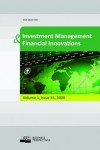Testing of weak form of efficient market hypothesis: evidence from the Bahrain Bourse
Testing of weak form of efficient market hypothesis: evidence from the Bahrain Bourse
Author(s): Iqbal Thonse Hawaldar, Babitha Rohit, Prakash PintoSubject(s): Business Economy / Management, International relations/trade, Financial Markets
Published by: ТОВ “Консалтингово-видавнича компанія “Ділові перспективи”
Keywords: random walk; efficient market hypothesis; run test; autocorrelation test;
Summary/Abstract: Efficient market hypothesis (EMH) states that financial markets are “informationally efficient”, implying that current prices fully reflect all available information. The present study aims at testing the weak form of market efficiency of the individual stocks listed on the Bahrain Bourse for the period 2011 to 2015. Weak form of EMH is tested using the Kolmogorov-Smirnov goodness of fit test, run test and autocorrelation test. The K-S test result concludes that in general the stock price movement does not follow random walk. The results of the runs test reveals that share prices of seven companies do not follow random walk. Autocorrelation tests reveal that share prices exhibit low to moderate correlation varying from negative to positive values. As the study shows mixed results, it is difficult to conclude the weak form of efficiency of Bahrain Bourse.
Journal: Investment Management and Financial Innovations
- Issue Year: 14/2017
- Issue No: 2.2
- Page Range: 376-385
- Page Count: 10
- Language: English

